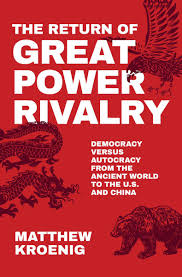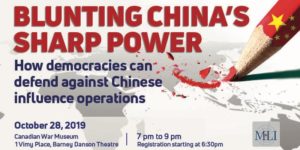 China’s authoritarian leadership organizes and implements policies in ways that often are systemically incompatible with democratic, free market nations, according to a new report from the Scowcroft Center’s Transatlantic Security Initiative. @AtlanticCouncil
China’s authoritarian leadership organizes and implements policies in ways that often are systemically incompatible with democratic, free market nations, according to a new report from the Scowcroft Center’s Transatlantic Security Initiative. @AtlanticCouncil
Under CPC leadership, China differentiates itself from free market democracies— in its foundational documents, “protect[ing] against the corroding influence of decadent capitalist and feudal ideas,” as the CPC constitution provides, and in the proscriptions of its leaders to “never copy the models or practices of other countries,” as CPC General Secretary and Chinese President Xi Jinping has stated, notes Atlantic Council distinguished fellow Franklin D. Kramer.
With respect to influence and the ideological competition, the most effective approach is the
attraction of the democratic, free market model. Inasmuch as democratic and free market countries include India, Indonesia, Malaysia, the Philippines, Japan, Republic of Korea, Australia, New Zealand, the EU/NATO countries, Canada, Mexico, and most of Latin America, as well as the United States, the democratic, free market model starts from a strong position, he writes in Managed Competition: Meeting China’s challenge in a multi-vector world.
 However, a good starting point does not obviate the need for an effective strategic approach. Such a strategy should include countering disinformation, economic coercion and political subversion, and increasing transparency regarding Chinese authoritarianism and refusal to adhere to international agreements and international law, Kramer adds:
However, a good starting point does not obviate the need for an effective strategic approach. Such a strategy should include countering disinformation, economic coercion and political subversion, and increasing transparency regarding Chinese authoritarianism and refusal to adhere to international agreements and international law, Kramer adds:
■ recognize that democratic and free market countries are predominant, including in the Indo-Pacific (India, Indonesia, Malaysia, Philippines, Japan, the Republic of Korea, Australia, and New Zealand), in Europe (the countries of the EU and NATO), in North America (Canada,
Mexico, and the United States), and in the rest of the hemisphere (most countries of Latin America);
■  coordinate efforts to support democratic institutions, including actively countering Chinese disinformation, economic coercion, and political subversion {what the National Endowment for Democracy calls sharp power} with appropriate intelligence and information sharing;
coordinate efforts to support democratic institutions, including actively countering Chinese disinformation, economic coercion, and political subversion {what the National Endowment for Democracy calls sharp power} with appropriate intelligence and information sharing;
■ undertake expanded transparency regarding Chinese authoritarianism and refusal to adhere to international agreements and international law; and
■ utilize military diplomacy to coordinate military exchanges and training, and engage multinational military approaches as one element of structured cooperation among democratic, free market nations.
In The Return of Great Power Rivalry (above), Matthew Kroenig @kroenig argues that democracies tend to excel in great power rivalries due to unique economic, diplomatic, and military advantages in long-run geopolitical competitions, whereas autocratic advantages are more than outweighed by their vulnerabilities.







